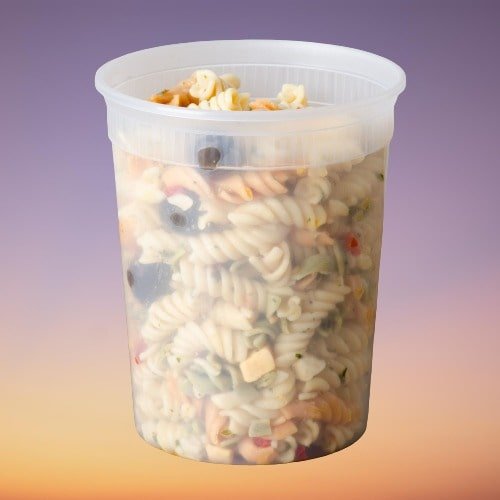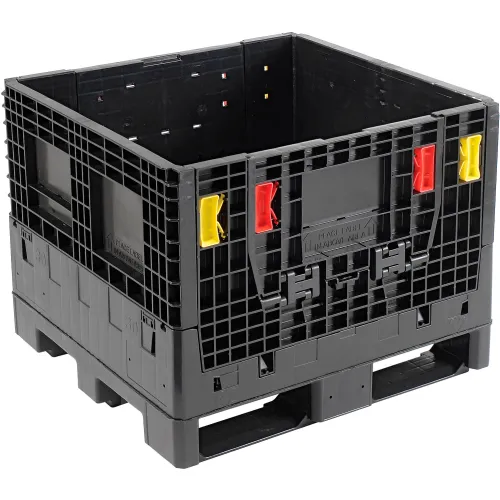The Role of Mass Plastic Containers in Effective Recycling Practices and Sustainability
Mass plastic containers are important to contemporary reusing efforts. Their layout enhances the efficiency of product collection and transportation, adding to sustainability goals. These containers not only enhance area however also aid in checking contamination degrees. Nevertheless, their implementation is not without difficulties. Comprehending the full extent of their effect discloses an intricate partnership between logistics and ecological duty that necessitates additional expedition.
Understanding Bulk Plastic Containers
Mass plastic containers function as a vital part in numerous sectors, helping with the storage space and transport of goods. These containers are normally made from durable products such as high-density polyethylene (HDPE) or polypropylene, which give sturdiness and resistance to ecological variables. Their style typically consists of features like stackability and modularity, allowing for efficient usage of space throughout both storage and transit.
Industries such as agriculture, food handling, and making regularly use bulk plastic containers due to their lightweight nature and ease of handling. The containers are available in numerous sizes and setups, satisfying the particular needs of different items. Their versatility expands past plain capability; they can additionally be tailored with covers, manages, and identifying choices to boost usability - bulk plastic containers for sale. Therefore, mass plastic containers play a crucial function in optimizing logistics and supply chain procedures across multiple fields, thus adding to total effectiveness and cost-effectiveness
Benefits of Utilizing Mass Plastic Containers in Recycling
When organizations focus on reusing efforts, the use of bulk plastic containers considerably enhances the efficiency of the procedure. These containers are made to optimize area, permitting the storage and transport of bigger amounts of recyclable products. This causes fewer journeys to reusing centers, thereby decreasing fuel intake and connected exhausts.
Furthermore, bulk plastic containers are resistant and long lasting to numerous environmental variables, guaranteeing that materials continue to be safeguarded throughout handling and transit. Their light-weight style additionally adds to reduce transportation prices.
The uniformity of these containers assists in much better sorting and handling of recyclable materials, which can improve general recycling prices. Organizations that take on bulk plastic containers also demonstrate a commitment to sustainability, positively influencing their brand name picture. Ultimately, these benefits not just improve reusing methods yet additionally contribute to broader ecological objectives
How Mass Plastic Containers Facilitate Material Collection
Reliable product collection is significantly enhanced by the use mass plastic containers, as they provide a structured and effective option for gathering recyclable products. These containers are designed to fit huge volumes of materials, which simplifies the sorting and storage space procedure. Their stackable design optimizes area usage, making it simpler for facilities to arrange recyclables without mess.
Additionally, bulk plastic containers are long lasting and weather-resistant, allowing for exterior placement without degradation. This resilience assures that materials stay protected till they are collected for processing.

The uniformity in size and form of these containers assists in standardization across collection factors, enabling much better tracking of recyclable volumes. Their transparent nature permits for very easy exposure of materials, aiding in the monitoring of contamination levels and guaranteeing that only ideal materials are accumulated. Generally, bulk plastic containers play a crucial function in streamlining the product collection procedure, thus promoting reliable reusing techniques.
Transportation Performance and Environmental Impact
Transportation effectiveness plays a necessary function in the reusing procedure, especially with the optimization of lots capability wholesale plastic containers. By taking full advantage of the quantity of material delivered, companies can substantially decrease the number of journeys needed, therefore minimizing their carbon impact. This method not just boosts operational performance yet likewise adds to a lot more sustainable ecological techniques.

Optimizing Lots Ability
Optimizing tons capability is frequently neglected, it plays a necessary function in boosting transportation efficiency and reducing ecological impact in reusing practices. By optimizing the quantity that mass plastic containers can hold, reusing procedures can reduce the variety of journeys required for transportation. This not just decreases gas usage but additionally lowers the deterioration on vehicles. Reliable lots management permits centers to utilize room successfully, making certain that each transport cycle is as productive as possible. In addition, well-optimized lots can bring about far better arrangements with logistics carriers, possibly reducing total costs. Ultimately, boosting tons capacity adds to an extra sustainable reusing system by promoting efficient source use and lessening waste created during transportation.
Lowering Carbon Impact
As recycling procedures endeavor to decrease their ecological impact, lowering the carbon impact related to transportation emerges as an essential objective. Mass plastic containers play an important role in achieving this objective by boosting tons performance and optimizing logistics. Their light-weight yet sturdy style permits maximum freight room application, decreasing the variety of journeys called for to deliver products. By settling deliveries, reusing centers can lower fuel usage and greenhouse gas discharges. Additionally, purposefully finding recycling facilities reduces transport distances, in addition lowering carbon results. In addition, using fuel-efficient vehicles and alternate power sources improves overall sustainability. By integrating these methods, the recycling market can appreciably lessen its carbon footprint, adding to an extra lasting future.
Challenges in the Usage of Bulk Plastic Containers

Contamination Problems
Contamination concerns represent a considerable challenge in the reliable usage of bulk plastic containers within reusing practices. These containers frequently accumulate deposits from previous components, causing combined products that can prevent the reusing process. Contaminants such as food waste, chemicals, or non-recyclable materials can compromise the integrity of the whole batch, causing boosted disposal prices and reduced reusing prices. Additionally, incorrect cleansing or sorting can aggravate these issues, making it challenging for recycling centers to refine materials efficiently. The presence of impurities not only affects the top quality of recycled items but additionally threatens the overall sustainability initiatives focused on decreasing plastic waste. Addressing these contamination challenges is important for improving the efficiency of bulk plastic container recycling.
Recycling Facilities Limitations
Inadequacy in recycling infrastructure positions significant difficulties for the effective administration of bulk plastic containers. Several reusing centers do not have the ability to refine huge volumes of these containers successfully, resulting in enhanced hold-ups and prices. Insufficient arranging modern technologies commonly lead to contamination, as mass containers might be blended with various other products, making complex the recycling procedure. Find Out More Minimal transportation options also hinder the motion of mass plastic containers to appropriate reusing facilities, leading to boosted landfill waste. Additionally, a lack of standard methods for bulk container recycling develops confusion amongst businesses and customers, further complicating initiatives to promote sustainability. Dealing with these framework constraints is vital to improve reusing techniques and optimize the capacity of bulk plastic containers in a round economic climate.
Finest Practices for Executing Bulk Plastic Containers
When companies take into consideration applying bulk plastic containers in their recycling practices, they should focus on a tactical approach that boosts effectiveness and minimizes contamination risks. Initially, selecting the appropriate container size and kind is vital to accommodate the quantity of products being refined. Organizations should likewise develop clear labeling and signage to direct users on proper disposal approaches, minimizing complication and mistakes. Routine training sessions for staff can further reinforce these techniques, ensuring every person recognizes their roles in keeping reusing honesty.
Additionally, companies ought to execute a routine maintenance schedule to check and clean containers, stopping the buildup of contaminants. Partnering with neighborhood reusing facilities can also simplify the collection process, ensuring that products are successfully processed. Companies must keep track of and examine their recycling metrics, using this information to improve practices over time and advertise continual enhancement in their sustainability efforts.
The Future of Bulk Plastic Containers in Lasting Practices
As companies progressively focus on sustainability, the function of mass plastic containers in recycling techniques is set to progress considerably. Developments in materials science are leading to the growth of naturally degradable and recyclable alternatives, enhancing the environmental benefits of bulk plastic containers. Additionally, the implementation of closed-loop systems will enable easier collection and repurposing of these containers, decreasing waste and resource usage.
Technical innovations, such as clever monitoring systems, will certainly enable companies to keep an eye on the lifecycle of mass containers, boosting effectiveness in recycling procedures. As customer demand for sustainable methods grows, companies will likely embrace bulk plastic containers developed for reuse and long-term value. Collaboration between governments and sectors will cultivate the establishment of standardized reusing methods, guaranteeing that bulk containers are effectively incorporated into more comprehensive sustainability campaigns. In general, the future of bulk plastic containers shows up promising, with considerable capacity for adding to a round economic situation.
Regularly Asked Questions
Exactly How Are Mass Plastic Containers Made and What Products Are Used?
Mass plastic containers are generally made from high-density polyethylene (HDPE) or polypropylene (PP) These products are refined through shot molding or have a peek at these guys impact molding methods, leading to long lasting, light-weight containers ideal for numerous storage and transport needs.
Can Mass Plastic Containers Be Recycled Multiple Times Prior To Recycling?
Yes, bulk plastic containers can be reused numerous times before reusing. Their durability and style permit duplicated use in various applications, promoting sustainability and resource performance while lowering the need for new containers.

What Qualifications Exist for Mass Plastic Containers in Recycling?
Numerous qualifications for mass plastic containers include the Recycling Partnership's certification, the Cradle to Cradle Licensed ™ standard, and the Sustainable Packaging Coalition's guidelines, ensuring containers meet particular ecological and recyclability standards for effective recycling.
Just How Do Bulk Plastic Containers Compare to Other Recycling Storage Options?
Mass plastic containers provide higher longevity and ability compared to various other recycling storage space options, minimizing the threat of contamination and promoting effective transport. Their design sustains much better organization, improving total effectiveness in recycling procedures.
What Is the Life-span of a Bulk Plastic Container in Recycling Processes?
The life expectancy of a mass plastic container in recycling procedures generally varies from 5 to one decade, relying on usage, worldly quality, and ecological conditions, enabling numerous cycles of usage before eventual disposal or recycling.
When companies prioritize reusing efforts, the go right here utilization of bulk plastic containers considerably boosts the performance of the process. Transport effectiveness plays a necessary function in the recycling process, specifically via the optimization of load capability in mass plastic containers. The use of bulk plastic containers in reusing methods faces significant challenges, especially worrying contamination issues and constraints within recycling facilities. Contamination concerns stand for a considerable obstacle in the effective use of bulk plastic containers within recycling practices. When companies think about executing bulk plastic containers in their recycling practices, they should prioritize a calculated strategy that boosts performance and decreases contamination threats.